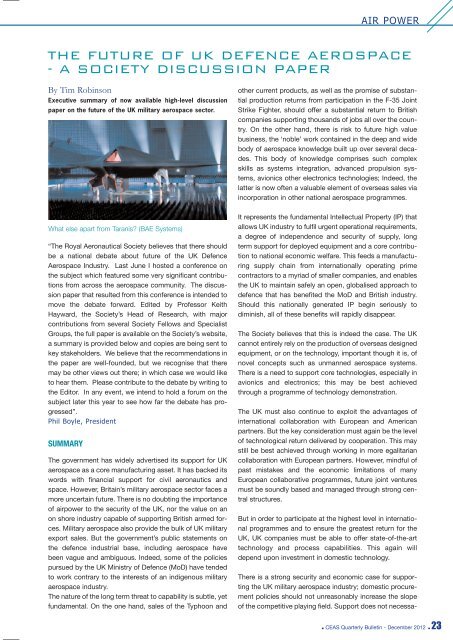Iam - CEAS. Council of European Aerospace Societies
Iam - CEAS. Council of European Aerospace Societies
Iam - CEAS. Council of European Aerospace Societies
Create successful ePaper yourself
Turn your PDF publications into a flip-book with our unique Google optimized e-Paper software.
By Tim Robinson<br />
Executive summary <strong>of</strong> now available high-level discussion<br />
paper on the future <strong>of</strong> the UK military aerospace sector.<br />
AIR POWER<br />
THE FUTURE OF UK DEFENCE AEROSPACE<br />
- A SOCIETY DISCUSSION PAPER<br />
What else apart from Taranis? (BAE Systems)<br />
“The Royal Aeronautical Society believes that there should<br />
be a national debate about future <strong>of</strong> the UK Defence<br />
<strong>Aerospace</strong> Industry. Last June I hosted a conference on<br />
the subject which featured some very significant contributions<br />
from across the aerospace community. The discussion<br />
paper that resulted from this conference is intended to<br />
move the debate forward. Edited by Pr<strong>of</strong>essor Keith<br />
Hayward, the Society’s Head <strong>of</strong> Research, with major<br />
contributions from several Society Fellows and Specialist<br />
Groups, the full paper is available on the Society’s website,<br />
a summary is provided below and copies are being sent to<br />
key stakeholders. We believe that the recommendations in<br />
the paper are well-founded, but we recognise that there<br />
may be other views out there; in which case we would like<br />
to hear them. Please contribute to the debate by writing to<br />
the Editor. In any event, we intend to hold a forum on the<br />
subject later this year to see how far the debate has progressed”.<br />
Phil Boyle, President<br />
SUMMARY<br />
The government has widely advertised its support for UK<br />
aerospace as a core manufacturing asset. It has backed its<br />
words with financial support for civil aeronautics and<br />
space. However, Britain’s military aerospace sector faces a<br />
more uncertain future. There is no doubting the importance<br />
<strong>of</strong> airpower to the security <strong>of</strong> the UK, nor the value on an<br />
on shore industry capable <strong>of</strong> supporting British armed forces.<br />
Military aerospace also provide the bulk <strong>of</strong> UK military<br />
export sales. But the government’s public statements on<br />
the defence industrial base, including aerospace have<br />
been vague and ambiguous. Indeed, some <strong>of</strong> the policies<br />
pursued by the UK Ministry <strong>of</strong> Defence (MoD) have tended<br />
to work contrary to the interests <strong>of</strong> an indigenous military<br />
aerospace industry.<br />
The nature <strong>of</strong> the long term threat to capability is subtle, yet<br />
fundamental. On the one hand, sales <strong>of</strong> the Typhoon and<br />
other current products, as well as the promise <strong>of</strong> substantial<br />
production returns from participation in the F-35 Joint<br />
Strike Fighter, should <strong>of</strong>fer a substantial return to British<br />
companies supporting thousands <strong>of</strong> jobs all over the country.<br />
On the other hand, there is risk to future high value<br />
business, the ‘noble’ work contained in the deep and wide<br />
body <strong>of</strong> aerospace knowledge built up over several decades.<br />
This body <strong>of</strong> knowledge comprises such complex<br />
skills as systems integration, advanced propulsion systems,<br />
avionics other electronics technologies; Indeed, the<br />
latter is now <strong>of</strong>ten a valuable element <strong>of</strong> overseas sales via<br />
incorporation in other national aerospace programmes.<br />
It represents the fundamental Intellectual Property (IP) that<br />
allows UK industry to fulfil urgent operational requirements,<br />
a degree <strong>of</strong> independence and security <strong>of</strong> supply, long<br />
term support for deployed equipment and a core contribution<br />
to national economic welfare. This feeds a manufacturing<br />
supply chain from internationally operating prime<br />
contractors to a myriad <strong>of</strong> smaller companies, and enables<br />
the UK to maintain safely an open, globalised approach to<br />
defence that has benefited the MoD and British industry.<br />
Should this nationally generated IP begin seriously to<br />
diminish, all <strong>of</strong> these benefits will rapidly disappear.<br />
The Society believes that this is indeed the case. The UK<br />
cannot entirely rely on the production <strong>of</strong> overseas designed<br />
equipment, or on the technology, important though it is, <strong>of</strong><br />
novel concepts such as unmanned aerospace systems.<br />
There is a need to support core technologies, especially in<br />
avionics and electronics; this may be best achieved<br />
through a programme <strong>of</strong> technology demonstration.<br />
The UK must also continue to exploit the advantages <strong>of</strong><br />
international collaboration with <strong>European</strong> and American<br />
partners. But the key consideration must again be the level<br />
<strong>of</strong> technological return delivered by cooperation. This may<br />
still be best achieved through working in more egalitarian<br />
collaboration with <strong>European</strong> partners. However, mindful <strong>of</strong><br />
past mistakes and the economic limitations <strong>of</strong> many<br />
<strong>European</strong> collaborative programmes, future joint ventures<br />
must be soundly based and managed through strong central<br />
structures.<br />
But in order to participate at the highest level in international<br />
programmes and to ensure the greatest return for the<br />
UK, UK companies must be able to <strong>of</strong>fer state-<strong>of</strong>-the-art<br />
technology and process capabilities. This again will<br />
depend upon investment in domestic technology.<br />
There is a strong security and economic case for supporting<br />
the UK military aerospace industry; domestic procurement<br />
policies should not unreasonably increase the slope<br />
<strong>of</strong> the competitive playing field. Support does not necessa-<br />
• <strong>CEAS</strong> Quarterly Bulletin - December 2012 • 23



